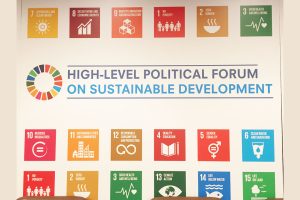The seventh Our Ocean Conference generated 410 commitments worth USD 16.35 billion across the issue areas of climate change, sustainable fisheries, sustainable blue economies, marine protected areas, maritime security, and marine pollution. Convening in a small island developing State (SIDS) for the first time, the conference underscored the critical importance of a healthy ocean to SIDS and to Indigenous Peoples and local communities (IPLCs) who rely on the ocean as a primary source of sustenance.
Co-hosted by Palau and the US, the conference addressed the theme, ‘Our Ocean, Our People, Our Prosperity.’ It brought together more than 600 representatives from governments, the private sector, intergovernmental organizations, academia, and non-governmental organizations (NGOs).
John Kerry, US Special Presidential Envoy for Climate, noted that the commitments pledged at the conference are “not just from countries but also from the private sector and non-governmental organizations – all of which are critical to winning [the] fight” for our ocean. The conference press release notes that since its inception in 2014, Our Ocean Conference has produced more than 1,800 commitments worth nearly USD 108 billion.
The conference featured panels on six areas of action. The panel on ‘Creating Sustainable Blue Economies’ focused on “blue recovery” from the COVID-19 pandemic towards ocean economies that are sustainable, equitable, and resilient, and explored opportunities for a “blue stimulus.” A total of 89 commitments worth USD 5.7 billion were made for sustainable blue economies – the largest amount of all action areas.
The panel titled, ‘Confronting the Ocean-Climate Crisis or Towards an Ocean Solution to Climate Change,’ featured climate change mitigation and adaptation success stories, and provided a platform to identify solutions for a climate-resilient future. Participants underscored the importance of ocean-based climate solutions, including decarbonizing the shipping industry, supporting marine nature-based solutions, and promoting offshore renewable energy, to improve global climate resilience and keep the 1.5°C target “within reach.”
Surangel Whipps Jr., President of Palau, said SIDS are “on the frontlines of the dual ocean and climate challenges.” “By hosting the meeting, Palau was not only able to show the world just how vulnerable we are to these crises, but also the many solutions available to tackle the problems today if we just choose to use them,” he stressed.
Eighty-nine commitments worth USD 4.9 billion, the second-largest amount, were pledged for the climate change action area.
The panel on ‘Tackling Marine Pollution’ highlighted that most marine pollution originates from land-based sources and includes plastic pollution and eutrophication (excessive richness in nutrients). It explored approaches to stop pollution at its source, and underscored the need for effective local management of coastal catchments. This action area generated 71 commitments worth USD 3.3 billion.
The panel on ‘Advancing Marine Protected Areas for Communities, Ecosystems, and Climate’ highlighted challenges, benefits, and opportunities associated with successful large-scale ocean conservation, and called for the development of regional networks of large-scale marine protected areas (LSMPAs) to conserve ocean biodiversity, promote climate resilience, and support marine resources and coastal communities’ livelihoods. This action area attracted 58 commitments worth USD 1.3 billion.
The panel on ‘Advancing Sustainable Small-Scale Fisheries and Aquaculture,’ highlighted actions needed for sustainable, equitable, resilient, and profitable small-scale fisheries and aquaculture that sustain local communities. Sustainable fisheries attracted 60 commitments worth USD 668 million.
The panel on ‘Achieving a Safe, Just and Secure Ocean’ showcased technological, financial, and legislative tools that can be used to achieve effective and sustainable ocean surveillance to combat illegal, unreported and unregulated (IUU) fishing, security threats, human exploitation, and unlawful activities. This action area resulted in 42 commitments worth USD 358 million.
The conference also recognized the role of Indigenous and youth leadership in protecting the ocean. “Our ancestral life-giving ocean is the world’s last, and greatest, defense against climate change,” stated youth delegate Kalani Reyes, founder of Deep Pacific Collective of Pacific Peoples. “We must work together, across generations to protect the ocean.”
Our Ocean Conference 2022 contributed to the advancement of multiple SDGs, most notably SDG 14 (life below water), SDG 13 (climate action), and SDG 17 (partnerships for the Goals). SDG 14 is one of the five Goals that the UN High-level Political Forum on Sustainable Development (HLPF) will review progress on in July. [Our Ocean Conference 2022 Website] [Opening Press Release] [Closing Press Release]


